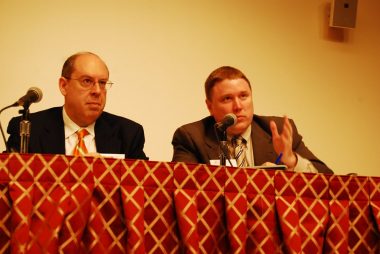Andy Curliss, Dick Barron and Ames Alexander will tell you some of the largest stories in journalism require open access to records so reporters can gather information.

The process of getting information from governments and corporations is an intricate one, requiring specific ways of gaining access and meticulous research on the part of a reporter, the three journalists said.
The panelists presented in a session called “The Big Stories Fueled by Open Government” at Sunshine Day on March 16. The panel was hosted by Curliss, of the Raleigh News & Observer, and he was joined by Barron, of the Greensboro News & Record, and Alexander, of the Charlotte Observer. All three journalists have worked on investigative reports, using open records laws to find information that made their stories successful.
But it wasn’t always easy, they said.
“As journalists, I believe it’s our obligation to press governments and corporations to open up these deals so we get a chance to see what goes on in these neglected shadow worlds of deal-making,” Barron said.
Curliss, Barron and Alexander all shared their experiences covering controversial stories, ones that took extensive research and access to public records. Without those records, they wouldn’t have had their stories.
In the case of Barron, the Dell computer plant in Winston-Salem was a constant story because the company routinely kept secrets, he said. And not just from the press, but also from the city government.
“We have to keep pressing because when you add secrecy to hundred of millions of dollars, you get a mix of temptation and bad decision-making that can often be bad for the public,” Barron said.
For him, as a former business reporter, the private corporation side of things is just as important as the governmental.
“The corporations must air their dirty laundry, dirty or otherwise,” he said.
In Curliss’ experience, though, the focus was more on openness in government. He said having access to e-mails helped prove that North Carolina State’s hiring of Mary Easley was set up by her husband and then-governor of North Carolina Mike Easley. But that access only came after a battle.
“We’re asking for the information and they’re not releasing it,” he said. “I think why (N.C. State University) released it was…there was so much public pressure from our stories that the trustees invoked the integrity exemption.”
Alexander’s work was more in the area of general investigative reporting. He covered many issues in Charlotte, from an increasing trend of slow ambulance responses to a factory that managed to pay only part of its fines on safety violations, including one where a worked died. He said open records fueled many of his investigative stories.
“With state and federal inspection records we were able to show that the agencies almost never use their toughest penalties, even when companies have a history of violating workplace safety rules,” he said.
Going about obtaining public records and information takes research, the panelists agreed, and it’s not an easy task.
“One of the things I find to be most helpful before I start requesting public records is just to do a whole lot of homework in advance,” Alexander said.
And Barron: “You’d be amazed what you can find with a couple hours of heavy Google-ing, or other research methods. I’ve stumbled upon some amazing databases that way, but you have to have the time and the patience to have a lot of dead ends, but you’ll find stuff.”
— by Jack Dodson, ’12


